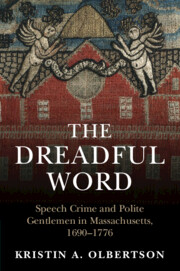5 - Credibility
Published online by Cambridge University Press: 03 March 2022
Summary
In Massachusetts, the elite solidified their identity and legitimated their claims to rule by linking veracity, and all the social perquisites that entailed, to gentlemanliness and whiteness. Laws against deceptive speech practices, and prosecutions of them, concretized and reinforced cultural associations between gentility and credibility. These prosecutions also had larger political significance. In naming defendants as false speakers, presentments and prosecutions formally defined them as ineligible for participation in a community of shared civil discourse. In perjury prosecutions, this process meant that certain men were much more likely to be believed in institutional and legal contexts, thus endowing them with greater power in those contexts. In false news prosecutions, the process enabled a small coterie to control sanctioned versions of public information. The outrage manifested over mumpers reveals elite anxieties about the strength and resilience of these still-emerging ideologies of truth-telling. But these tricksters and their interventions in polite society nevertheless managed to expose the inherent deceptiveness of the polite ethos itself.
- Type
- Chapter
- Information
- The Dreadful WordSpeech Crime and Polite Gentlemen in Massachusetts, 1690–1776, pp. 181 - 251Publisher: Cambridge University PressPrint publication year: 2022

